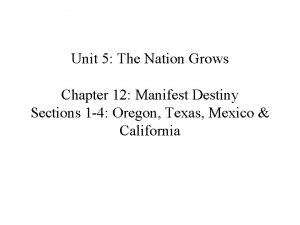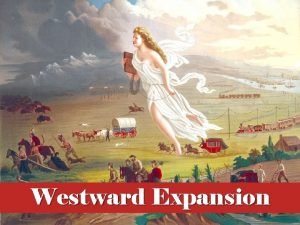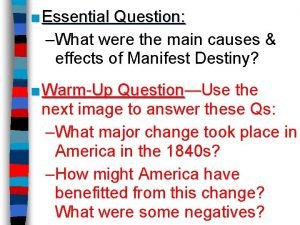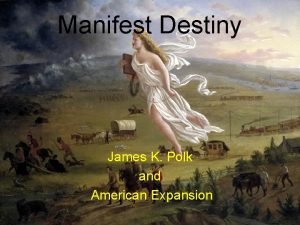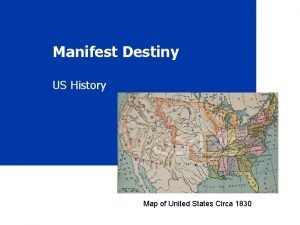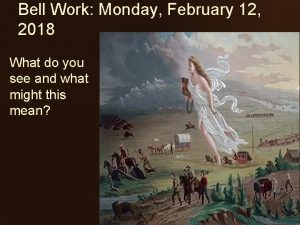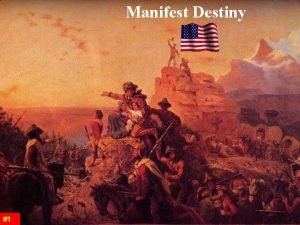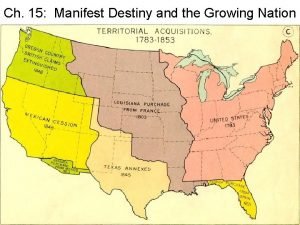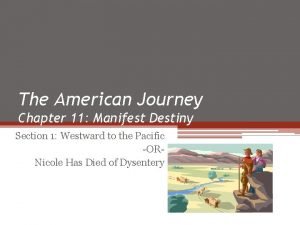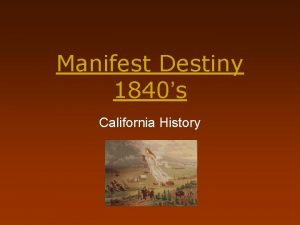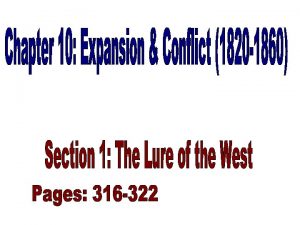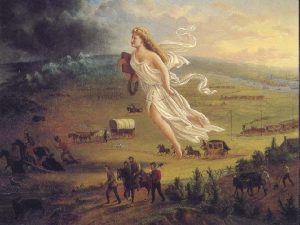Manifest Destiny Manifest Destiny The American conviction that














- Slides: 14

Manifest Destiny

Manifest Destiny �The American conviction that the U. S. had a divine mission to expand in order to spread the ideas of freedom and democracy. �Westward expansion increased national pride, but raised questions about slavery and fueled sectional differences.

Lands Acquired Between 1783 -1853 � Louisiana Purchase (1803)-Acquired from France for $15 million � Florida (1819)-Acquired from Spain through the Adams-Onis Treaty � Texas (1845)- Acquired from Mexico by annexation. Spain had long had settlements in Texas, but when Mexico declared independence from Spain in 1821, American settlers moved in. In 1836 settlers declared independence creating the Republic of Texas. Soon after in 1845 Texas joined the Union as a slave state.

Lands Acquired Between 1783 -1853 �Oregon Country (1846)-Gained from Great Britain in a compromise that continued the northern border set at the 49 th parallel �Mexican Cession (1848)-Became part of the U. S. by the Treaty of Guadalupe Hidalgo ending the Mexican American War (1846 -1848). The War was fought over the disputed land between the U. S. and Mexico and James K. Polk’s expansionist policies. �Gadsden Purchase (1853)-Purchased from


American Lands West in the Late 1800’s �Frederick Jackson Turner (The Frontier Thesis) "The existence of an area of free land, its continuous recession, and the advance of American settlement westward explain American development. " �Turner laid the foundation for modern historical study of the American West and presented a "frontier thesis" that continues to influence historical thinking even today

In 1862 Congress Passed three major acts to facilitate economic growth after the end of the Civil War �Homestead Act- 1862 Act that offered 160 acres of western lands for settlers. �Morrill Land Grant Act – Gave public lands to states and territories to found agriculture, mechanical arts and military science colleges �Transcontinental Railroad- Authorized by Congress and financed with public land grants and cash loans

Trouble in the West �The Great Plains: With continued westward expansion the Great Plains becomes the battle grounds between Native American Populations and white settlers �Reasons White Settlers Moved West: California Gold Rush; transcontinental railroad; and rich farmland �Indian Wars from 1850 – 1890 in which Native Americans were forced the accept treaties. � Reservations: limited area set aside for Native Americans by the U. S. government. � Dawes Act: 1887 law aimed at Americanizing Native

The Sioux Wars � 1865 -Federal government decides to build a road through Sioux territory. Sioux Warriors resist violently, sparking Red Cloud’s War. � 1867 -Red Cloud’s War Ends. Sioux agree to live on reservation in Dakota Territory � 1875 - Federal Government allows miners to search for silver and gold on Sioux reservation. 2 nd Sioux War begins. Sitting bull leads many Sioux off the reservation.

The Sioux Wars � 1876 -At the Battle of the Little Bighorn, Sitting Bull’s warriors destroy General Custer’s army. In response, federal government sends more troops and most Sioux agree to move to reservations. � 1890 - At the Massacre of Wounded Knee, America soldiers open fire on unarmed Sioux, killing 200

The Economy of the West �New technologies helped people move onto Native lands like railroads, barbed wire, winds mills and mechanical reapers increased yields and profits �Mining of Silver and Gold �Ranching �Farming �Cities like Omaha, Denver and San Francisco boom

Farmers, Populists and Politics � The Grange – Organization founded in 1867 meant to develop social ties between farmers later campaigned for state regulation of railroads and other reforms � The Populist Party-Political movement begun by farmers and members of labor unions in the late 1800’s seeking to limit the power of big business and grant greater say in the governmental process � The Election of 1896 – First election after an economic depression. The chief issue was free silver. Free coinage of silver would produce currency inflated in value that would make it easier for farmer to pay off debts. Favored by Populist William Jennings Bryan and argued against by William Mc. Kinley, who eventually won.

The Transcontinental Railroad �Reasons: Opened new markets in the West and brought products of western farms and mines east �Building: Completed on May 10, 1869 at Promontory Point Utah linking the Union Pacific and Central Pacific Railroads. �Effects on Native Americans: forced relocation to reservations and a loss of Native culture

Farmers and Railroad �The Grange Movement: Organization founded in 1867 meant to develop social ties between farmers later campaigned for state regulation of railroads and other reforms �Interstate Commerce Commission – agency created by the Interstate Commerce Act of 1887, to regulate railroads to ensure fair rates, and to eliminate rate discrimination. �Munn v. Illinois - Supreme Court case in which the Court upheld the power of government to regulate private industries.
 Manifest destiny was used to justify an american desire to
Manifest destiny was used to justify an american desire to Jimmy fallon gadsden purchase
Jimmy fallon gadsden purchase Chapter 12 manifest destiny
Chapter 12 manifest destiny Facts about westward expansion
Facts about westward expansion Reason for manifest destiny
Reason for manifest destiny Rio grande river
Rio grande river Manifest destiny map with dates
Manifest destiny map with dates How does this painting represent manifest destiny?
How does this painting represent manifest destiny? Manifest destiny
Manifest destiny Travel in a growing nation answer key
Travel in a growing nation answer key Manifest destiny newspaper
Manifest destiny newspaper Obvious fate
Obvious fate Manifest
Manifest Manifest destiny effect
Manifest destiny effect Costs of manifest destiny
Costs of manifest destiny


